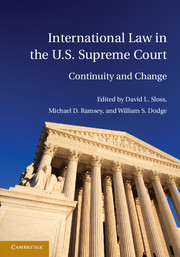Book contents
- Frontmatter
- Contents
- List of Contributors
- Table of Cases
- Acknowledgments
- Introduction
- PART I FROM THE FOUNDING TO THE CIVIL WAR
- PART II FROM THE CIVIL WAR TO THE TURN OF THE CENTURY
- PART III FROM THE TURN OF THE CENTURY TO WORLD WAR II
- 6 Treaties in the Supreme Court, 1901–1945
- 7 Customary International Law in the Supreme Court, 1901–1945
- 8 International Law as an Interpretive Tool in the Supreme Court, 1901–1945
- 9 Varieties and Complexities of Doctrinal Change: Historical Commentary, 1901–1945
- PART IV FROM WORLD WAR II TO THE NEW MILLENNIUM
- PART V INTERNATIONAL LAW IN THE U.S. SUPREME COURT IN THE TWENTY-FIRST CENTURY
- V.A TREATIES AFTER 2000
- V.B CUSTOMARY INTERNATIONAL LAW AFTER 2000
- V.C INTERNATIONAL LAW AND CONSTITUTIONAL INTERPRETATION AFTER 2000
- V.D INTERNATIONAL LAW AND STATUTORY INTERPRETATION AFTER 2000
- V.E INTERNATIONAL LAW AND THE WAR ON TERROR
- VI CONCLUSION
- Index
- References
6 - Treaties in the Supreme Court, 1901–1945
Published online by Cambridge University Press: 05 July 2011
- Frontmatter
- Contents
- List of Contributors
- Table of Cases
- Acknowledgments
- Introduction
- PART I FROM THE FOUNDING TO THE CIVIL WAR
- PART II FROM THE CIVIL WAR TO THE TURN OF THE CENTURY
- PART III FROM THE TURN OF THE CENTURY TO WORLD WAR II
- 6 Treaties in the Supreme Court, 1901–1945
- 7 Customary International Law in the Supreme Court, 1901–1945
- 8 International Law as an Interpretive Tool in the Supreme Court, 1901–1945
- 9 Varieties and Complexities of Doctrinal Change: Historical Commentary, 1901–1945
- PART IV FROM WORLD WAR II TO THE NEW MILLENNIUM
- PART V INTERNATIONAL LAW IN THE U.S. SUPREME COURT IN THE TWENTY-FIRST CENTURY
- V.A TREATIES AFTER 2000
- V.B CUSTOMARY INTERNATIONAL LAW AFTER 2000
- V.C INTERNATIONAL LAW AND CONSTITUTIONAL INTERPRETATION AFTER 2000
- V.D INTERNATIONAL LAW AND STATUTORY INTERPRETATION AFTER 2000
- V.E INTERNATIONAL LAW AND THE WAR ON TERROR
- VI CONCLUSION
- Index
- References
Summary
The foreign affairs law of the United States in the decades immediately following the turn of the twentieth century was subject to immense forces of change. Victory in the Spanish-American War at the very end of the prior century – and the consequent acquisition of territories from the Caribbean to the western Pacific – represented a definitive moment in the transformation of the United States from a regional to a global power. The country's dramatic rise as an economic and military force led to an increasing engagement (or entanglement) in world affairs. By the end of World War II the United States was one of only two global superpowers.
These events occurred amid a profoundly expanding faith in international legal cooperation and specifically in the regulatory power of treaties. Before the late nineteenth century, treaties usually served to end wars and settle boundaries, with the prominent exception of early treaties of friendship, commerce, and navigation. The years surrounding the turn of the twentieth century, however, witnessed a significant expansion in the field of operation for international treaties. Large and celebrated peace conferences in 1899 and 1907, for example, proclaimed solemn treaties designed to regulate the law of armed conflict and to settle international disputes. Similar sentiments led to the conclusion of treaties that set the foundation for the later Second and Third Geneva Conventions, as well as the Washington treaties limiting naval armaments and the use of submarines and poison gas.
- Type
- Chapter
- Information
- International Law in the U.S. Supreme Court , pp. 191 - 224Publisher: Cambridge University PressPrint publication year: 2011
References
- 1
- Cited by

